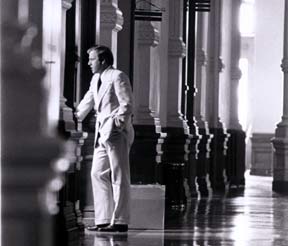Evangelical chaplains spark controversy
Posted: 2/17/06
Evangelical chaplains spark controversy
By Deborah Potter
Religion & Ethics Newsweekly
WASHINGTON (RNS)—The U.S. Armed Forces always have had chaplains, but as the number of chaplains from evangelical groups with a strong commitment to bringing nonbelievers to their faith has grown, so has a controversy about how the chaplaincy should carry out its ministry.
Historically, chaplains have served side-by-side with the troops in both peace and war, offering public prayers and private counseling—to all comers, of all faiths, believers and nonbelievers alike.
Chaplains’ “first obligation would be to (personnel of) their own denomination, but the next obligation is to anyone who comes to them for spiritual or pastoral counsel,” said Archbishop Edwin O’Brien, who oversees the military’s Catholic chaplains.
The number of Catholic and mainline Protestant chaplains has dwindled over the past decades as evangelical Christians have flocked to the chaplaincy. Some historians say the trend dates back to the Vietnam era, when Catholic and mainline Protestant churches were active in the peace movement while many evangelical churches supported the war.
Some evangelical chaplains now are telling service men and women that the only way to salvation is through Jesus Christ—an action O’Brien finds troubling.
“That is not accommodating the needs of others,” he said. “Some people don’t believe that, and it’s not my position as a chaplain to require that of them.
“I must respect who they are and what they are. Some evangelicals have stepped over the line.”
Others, however, note that bringing people to a personal encounter with Jesus is what evangelicalism is all about.
“I think a lot of evangelical conservative Christians see that as the basic work that they are to do,” said Kristen Leslie of the Yale Divinity School. “And that becomes a problem in a pluralistic environment where, because these are now employees of the government, you can’t do that.”
The issue publicly came to a head last year at the Air Force Academy, where complaints by Jewish cadets and others of proselytizing by evangelical officers and cadets led to a Pentagon investigation.
In response, the Air Force issued new interim guidelines telling chaplains to be “sensitive to those who do not welcome offerings of faith.”
In public settings where attendance is mandatory, chaplains were told to offer brief “nonsectarian” prayers.
That did not sit well with some evangelical chaplains and their supporters on Capitol Hill.
“Our men and women in uniform are in Iraq and Afghanistan to defend freedom,” said Rep. Walter Jones, R-N.C. “And yet we’re having our chaplains being denied their freedom to pray in the name of their faith.”
Jones and 70 other members of Congress have been pressuring the White House to issue an executive order allowing chaplains to pray according to their faith.
A spokesman for Jones said the congressman recently discussed the guidelines with President Bush’s domestic policy adviser and now feels the White House “seems to be taking the issue seriously” and progress is being made.
Navy Chaplain Gordon Klingenschmitt, a priest in the Evangelical Episcopal Church, says he was disciplined for some of his shipboard sermons. He has been working with Jones to overturn the interim guidelines. In December, he went on an 18-day hunger strike outside the White House to protest what he said were restrictions on how he could pray and preach.
“When the government says to me that, well, you can practice your faith in private but don’t say the “J-word” in public, because the Jesus word is insensitive, well, they’re characterizing “Jesus Christ” as an offensive word. And they’re turning my Lord into a slur,” he said. “Well, that is inherently offensive to me, and that is inherently discriminatory to people of my faith tradition.”
But Barry Lynn, executive director of Americans United for Separation of Church and State, disagrees.
“When you’re hired as a chaplain, when you become an officer in the United States military, as every person in the military does, you give up certain First Amend-ment rights,” Lynn said. “But this is not fundamentally an issue of free speech. This is an idea of how the taxpayers are supporting religion in the military and legitimate restraints on what those chaplains can do.”
Klingenschmitt said the issue is his ability to practice his faith.
“When I evangelize and I invite sailors to come and hear my sermons and they disagree, that’s fine,” he said. “They are never punished for disagreeing with me.
“But when I refused to practice the faith of liberal senior chaplains, I was punished with the full weight of the United States government. So, who is proselytizing whom?”
 up the challenge of this same task. Texas Baptists would not be who we are today without Phil Strickland. All of you who love the historic Baptist vision and cherish its values owe more than you know to Phil’s work and spirit.
up the challenge of this same task. Texas Baptists would not be who we are today without Phil Strickland. All of you who love the historic Baptist vision and cherish its values owe more than you know to Phil’s work and spirit.